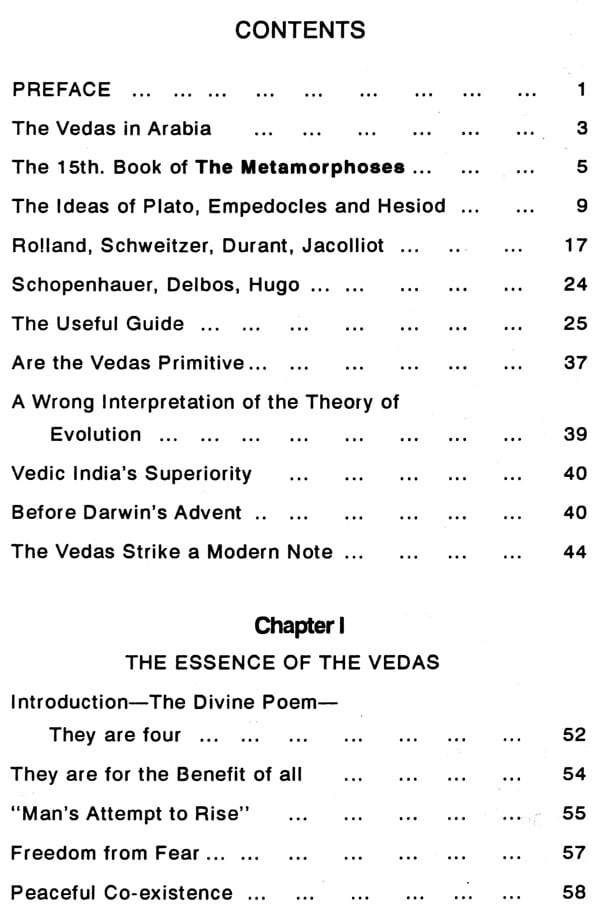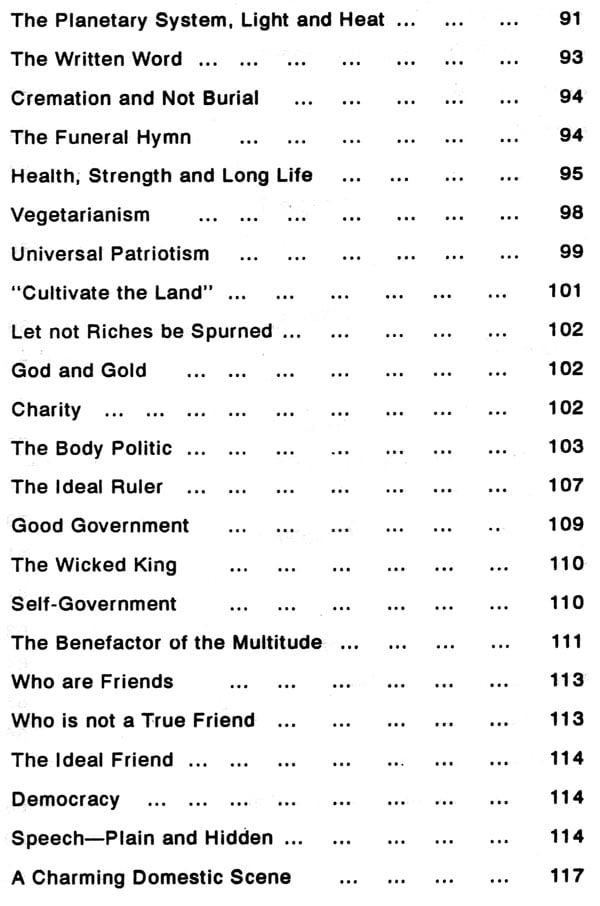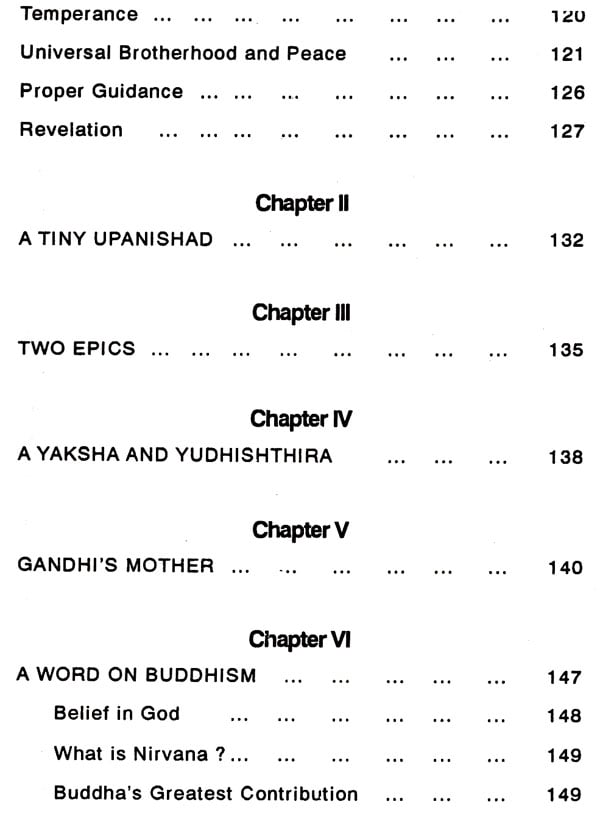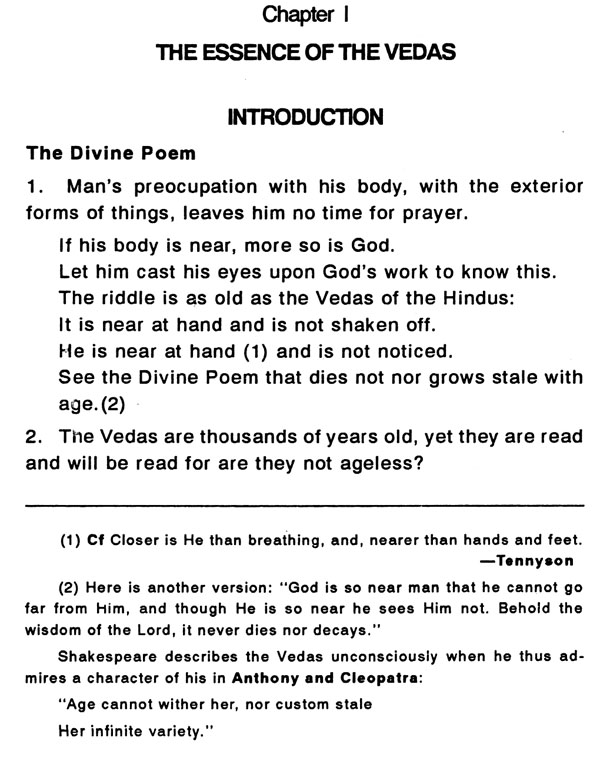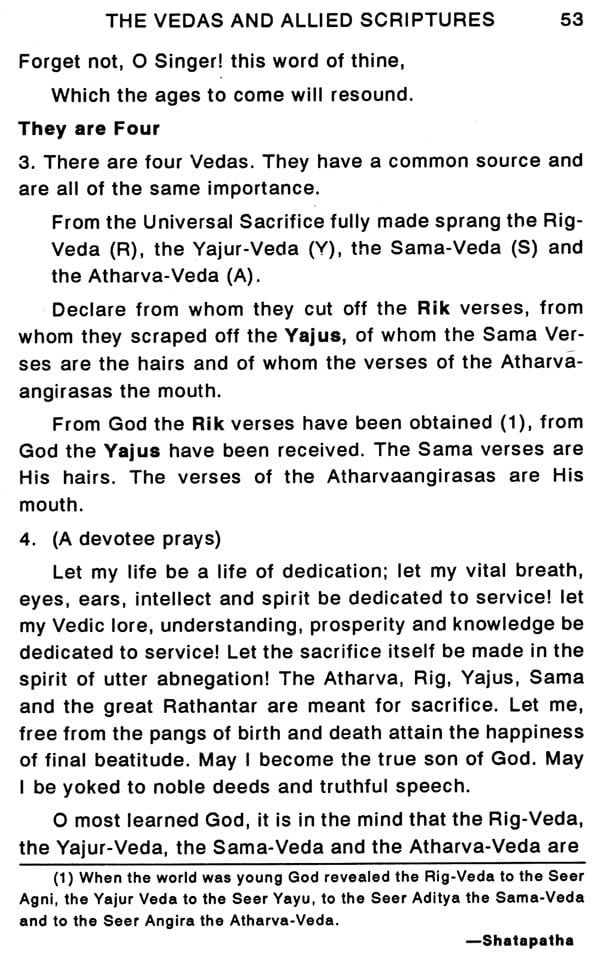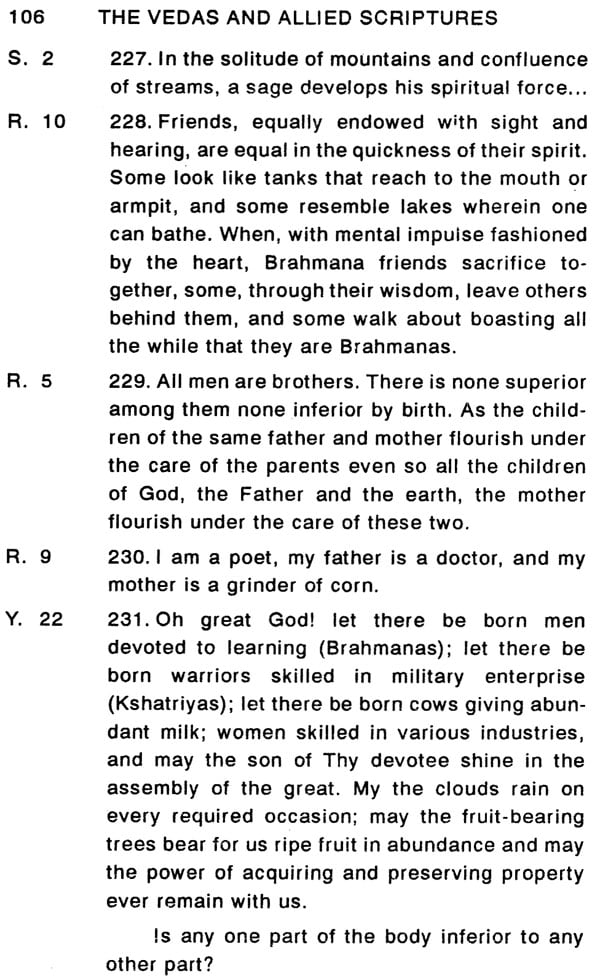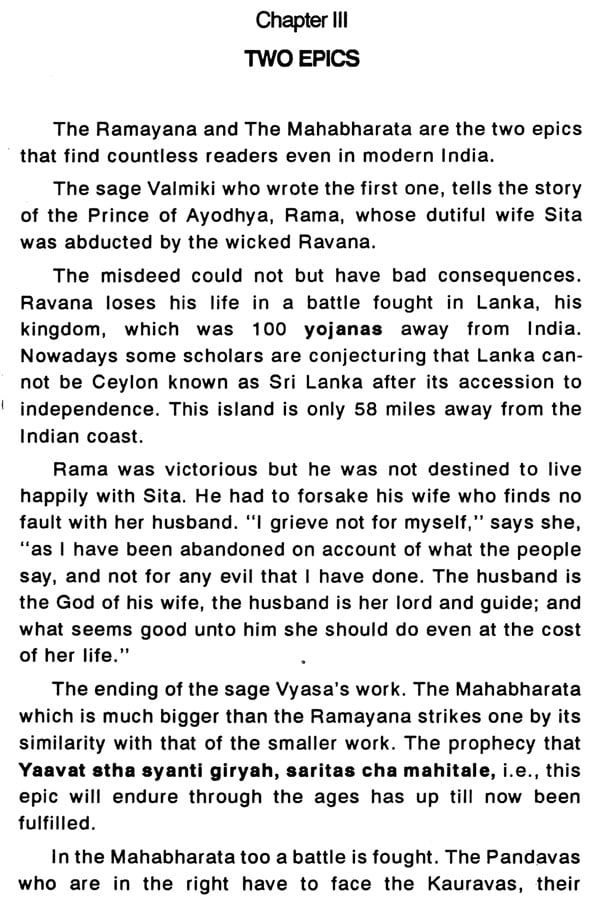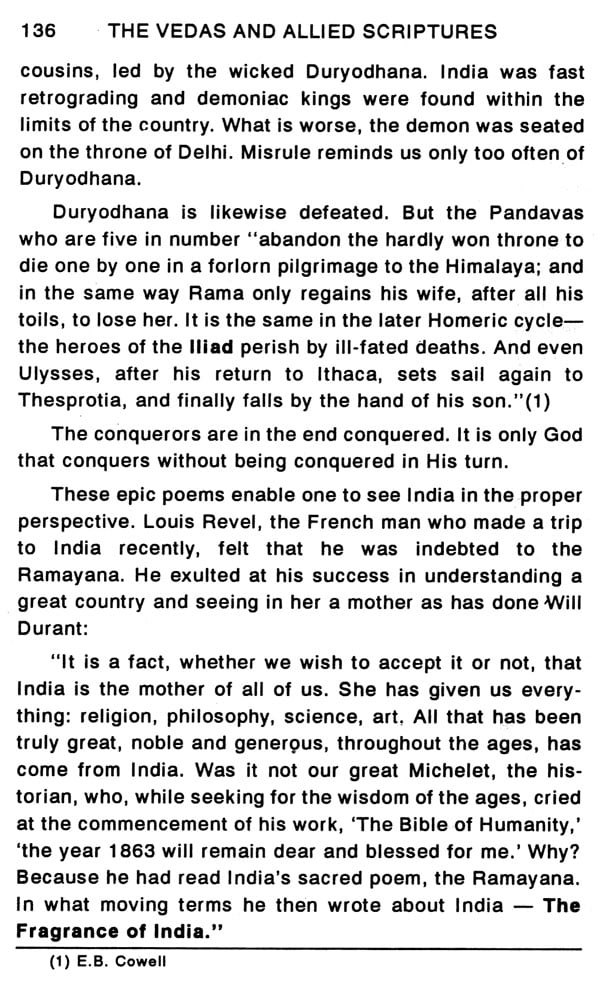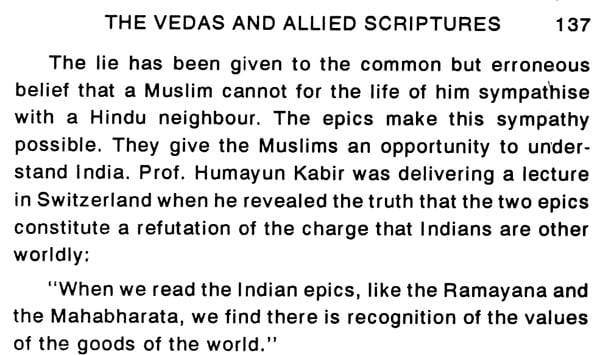
The Essence of the Vedas and Allied Scriptures
Book Specification
| Item Code: | NAU390 |
| Author: | Basdeo Bisoondoyal |
| Publisher: | Crest Publishing House |
| Language: | English |
| Edition: | 2001 |
| ISBN: | 8124200033 |
| Pages: | 158 |
| Cover: | PAPERBACK |
| Other Details | 8.50 X 5.50 inch |
| Weight | 200 gm |
Book Description
This selection of verses comprises the main ideas of the Vedas. The author has succeeded in proving that the great thoughts of the master mind of the West and the East are reminiscent of those that are to be found in the Vedas. The book is stimulating. The introduction makes interesting reading. It brings an abstruse subject within reach of one and all and thus creates in the reader the desire to read the whole work at a stretch. Almost all the scholars of the West and India, Viz. Max Muller, Griffith, Wilson, Langlois and Renou on the one hand and Swami Dayananda Saraswati on the other have inspired the author. When a verse has been found to have not been rendered into English or French in such a way as to give satisfaction to students who have read Dayananda, Aurobindo and others whose interpretation is authoritative it has been slightly modified. The reading public will no doubt agree with us that The Essence of the Vedas and Allied Scriptures, the present work is a desideratum.
About the Author Professor Basdeo Bissoondoyal is an Indian settled in Mauritius. He was educated in the Punjab and at Calcutta. While an undergraduate he came under the influence of Dr. Gokulchand Narang, a veteran statesman and a well known author of Real Hinduism, Transformation of Sikhism and other popular works. The professor's reputation as an author is well established. His books has been published in Paris Les Hindous Et Ecritures Sacrees. Bharatiya Vidya Bhavan has also published his France Looks At Modem India.
The saddening news came on the eve of World War I that European Powers would soon be at war with one another when in France G. Clemenceau, the great French statesman, who was then engaged in conversation with the Countess de Noailles, the French Sarojini Naidu, was stunned. So was the countess.
It dawned on both that the only book that could give some relief was Tagore's Gitanjali. Andre Gide who was to win the Nobel Prize later had translated the book into French. Clemenceau had a copy of it. Some of the lyrics were read and they brought timely relief. The lyrics of which Gitanjali is composed are based on Vedic hymns. Through them the hymns of the Vedas were being appreciated at a time Europe was in trouble. M. Maeterlink, Tagore's contemporary, likewise admired the Vedas. An oft-quoted passage from one of his books is : "It is now hardly to be contested that this source (of knowledge) is to be found in India. Thence in all probability the sacred teaching spread into Egypt, found its way to ancient Persia and Chaldea, permeated the Hebrew race and crept in Greece and the south of Europe, finally reaching China and even America.
" The opinion we give below is his again : "Only the gaze of the clairvoyant directed upon the mysteries of the past may reveal the unrivalled wisdom which lies hidden behind these writings (The Vedas)." Much earlier, Schopenhauer, the famous German philosopher, derived solace from the Upanishads that are excellent expositions of the Vedas. If Europe which is in the van of progress is, from time to time, led to welcome the Vedas, is it not necessary for us to try to bring these books within the reach of one and all ?
The reading public will no doubt agree with us that The Essence of the Vedas and Allied Scriptures, the present work, is a desideratum. Almost all the scholars of the West and India, viz. Max Muller, Griffith, Wilson, Langlois and Renou on the one hand and Swami Dayananda Saraswati on the other have inspired the author. When a verse has been found to have not been rendered into English or French in such a way as to give satisfaction to students who have read Dayananda, Aurobindo and others whose interpretation is authoritative it has been slightly modified.
The translations available do not always do justice to the Vedas. It is customary to liken the Veda to the source of a river. The water at the source is pure. It is much farther from the source that polluted water is detected. Vedic knowledge is so pure that even when it is not properly understood by the translators the translations succeed in giving an idea of what those books contain. It has been found that in the West some Vedic ideas that had beer misrepresented when they reached that part of the world orally, gave rise to a rich body of literature. Charlotte Manning quotes Kuhn as saying that the Vedic cloud-dragon was the original of many dragons. She writes: "Vritra, the demon which imprisoned the rains, was the same as Ahi, Ahi was the same as Sushna, and Sushna was another name for drought. Thus drought was a dragon, and Kuhn believes that this Vedic cloud-dragon was the original of all the dragons which abound in the sculptures, pictures and stones of Northern Europe, including that over which St. George of England triumphed."
As the following note, found in the beginning of R.C. Dutt's Lays of ancient India, will show, South Europe did not remain untouched: "The rays of light are compared to cattle which have been stolen by the powers of darkness, and Indra (the Sky) seeks for them in vain. He sends Sarama (the Dawn) after them, and Sarama finds out the Bilu or fortress where the Panis or powers of darkness have concealed the cattle. The Panis try to tempt Sarama, but in vain. Sarama comes back to Indra, and Indra marches with his forces, destroys the fort, and recovers the cattle; the darkness is gone, and it is day...Professor Max Muller maintains that the story of the siege of Troy is a development of this simple Vedic myth...Ilium, according to the Professor, is Bilu, the cave or the fortress of the Rig Veda. Paris is the Panis of the Veda who tempt, and Helena is the Vedic Sarama who resists the temptation in the Veda, but succumbs to it in Greek mythology " (Civilisation in Ancient India, Vol. I, p.80.) The disciples of Orpheus, however, had had a better knowledge of the Vedas. The story goes that Orpheus lived in the forests and made friends with birds, beasts and plants; that he had been to Egypt. We know for certain that there was a colony of Indians in Egypt. These Indians communicated the knowledge they had acquired to the West. The Orphic religion preaches monotheism and describes God by using the very words of the Vedas. Like the Indians, the followers of Orpheus prayea for peace at the end of each assembly held by them.
**Contents and Sample Pages**
